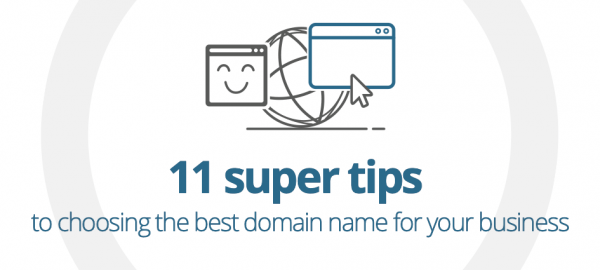When you choose a domain name for your business, it’s as important as choosing your business name – you have to consider every aspect of this decision will always be an integral part of your business.
The right domain name can work for you, impact your business in a positive direction, and be a force for good for you. The wrong domain can negatively impact your business, so you must make sure you give this decision all the thought it needs, and we’re here to help you, of course!
Here’s how you choose the perfect domain name for your business:
1. Keep it super-short.
If you choose a long and difficult-to-spell domain name, potential customers may mistype it or lose patience with it before they even get to your site, and this could mean you lose out on business or sales. Short and sweet domain names are always the way to go.
2. Use your keywords.
Most businesses these days will rely on being found by potential customers online, so it’s important to think about Search Engine Optimisation (SEO). When you choose your business domain name, consider what keywords someone might use to find your services, and consider whether these keywords could make up a good domain name for you, making your SEO work just a little bit easier. For example, if your business is making raincoats for puppies (Ohh, now you want one, right? A puppy in a raincoat!), consider registering puppyraincoats.com. If at all possible, using your main keywords in your domain will be great for SEO.
3. Make it easy for users to type.
Your domain name must be easy to type, so make sure you don’t leave your domain open to any interpretation, like using slang, text-speak, or shortened words. It will make it harder for your potential customers to type, and you risk losing them in the process.
4. Don’t use numbers.
It’s not that you can’t use numbers in your domain name, it’s that unless a number is part of your business name, you just shouldn’t. If you’re thinking the way to get your perfect domain name is to just add a number to the end (like it’s often done with Hotmails and Gmails), we urge you to reconsider, as this doesn’t work as well for domain names.
The exception to this, is if your business name includes a number, and in this case, the best thing to do is to register two domain names: One with the numeral number (1) and one with the spelled-out number (one). Then you choose one to be your main website address and the other one you can just point to the main one, so if someone types the second one, they are automatically redirected to the main one.
5. Don’t use hyphens either.
It’s generally best to avoid hyphens in domain names. Not because it affects SEO, which most people assume – Google’s crawlers don’t care whether your domain name has hyphens or not – but rather that websites with hyphens are at risk of being perceived as “spammy”.
If you must use hyphens in your website, keep it to only one, as they can give users a negative view of your website.
6. Use geography.
If you exclusively do business in a local area, it’s a great idea to add your geographic location to your website. As an example, let’s check back in with those cute puppies: If your puppy raincoat business were London-based, a great domain to choose would be londonpuppyraincoats.com or puppyraincoats.london.
7. Do your research.
When you set up your business and your domain name, one of the first things you need to do, is make sure nobody else has chosen the business name you want before you, that it isn’t copyrighted or trademarked. If it is, it could become very expensive, and you could end up losing the right to the name you chose.
8. Make it memorable.
If you want to stand out from the crowd, a great way to do this is to have a catchy or memorable domain name for your business.
9. Protect your brand.
Once you have decided on a domain name, it’s good to purchase various other domains names for brand protection. Consider securing the most common extensions (like .co.uk and .uk if you have chosen .com for your website), so others don’t start using domain names that are close to yours. Also, look for common misspellings and domain names that are very close to yours, this way, you don’t get a competitor buying these and taking advantage of your brand name.
10. Choose the right extension.
The ending to your domain name (like .com or .uk) is called a ‘domain extension’ or a ‘TLD’ (Top-Level Domain), and it’s important to choose the right one. In the UK, the .co.uk and .uk are the most popular ones, followed by .com and put together, they account for around 80% of all websites, so choosing one of them is a good choice if the name you want is available. But other domain extensions are available, and they might work for your business.
The new gTLDs (generic Top-Level Domains) are great if you want your domain name to show what kind of business you are, like .accountant and .tours.
Find out more about which types of extensions to use in our blog post Protect your brand with multiple domain extensions.
11. Get it, get it now!
You never know if someone out there is looking to register the exact domain name you’re after, so in the world of domain names, there’s always a bit of urgency. Our advice is never to wait – register your domain name as soon as you can.
Register your domain today
Want to know more?
You can visit The Hub for tips on starting your business with a domain name, a business email, and a website. You can also download free insightful e-books there.
